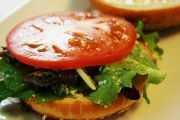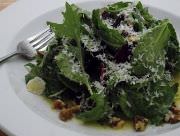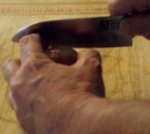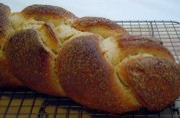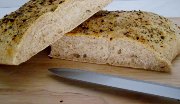Bread Making Tips And Bread Baking Information
All Bread baking recipes have a problem, they are at best only guidelines. The reason is bread baking is affected by the climate. If you live in a climate that is humid the recipe needs less water. If you live at a high altitude it rises too fast and the water evaporates at a much faster rate. So, the best that they can ever be is a guideline. Understanding this will help you bake better bread.
One of the best bread making tips I can pass along is that making bread requires diligence. If you stick with it, in time you will turn out really great bread.
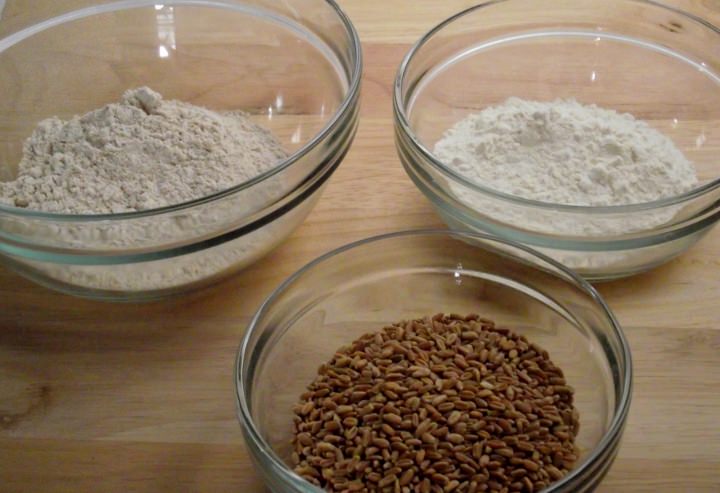 Whole wheat flour, all-purpose flour, and hard red winter wheat berries
Whole wheat flour, all-purpose flour, and hard red winter wheat berriesAbout Bread Baking And Yeast Doughs
What is it about bread? There is a quality about bread that hits us on an emotional level, like nothing else. We eat it as The Body Of Christ in our religious rituals, the Bible has many references to bread, and every culture on earth has some kind of bread, it truly is the staff of life.
Bread baking at its simplest, starts with four ingredients flour, water, salt, and yeast. That's it, four simple ingredients, a little time, some heat and you are rewarded with a simple flavor that is good beyond belief.
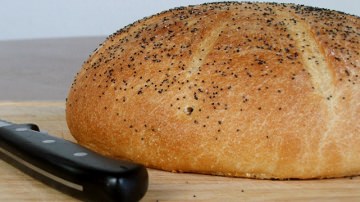
Wheat
Wheat flour is a staple ingredient that is used in baked goods of all types. It is used extensively because its gluten forming proteins provides the necessary structure for baked goods, particularly bread.
The wheat kernal is made up of the bran, endosperm, and germ. The bran makes up 14.5 percent of the total kernal weight. The endosperm makes up 83 percent of the total weight, and the germ makes up 2.5 percent of the total weight.
Wheat flour is classified by color and season, hard red winter wheat, hard white winter wheat, soft red winter wheat, and soft white winter wheat. Winter wheat is planted in winter and harvested in the summer. Hard red spring wheat is planted in the spring and harvested in the summer.
Some of the more common types of flour include all-purpose flour, bread flour, whole wheat flour, white whole wheat flour, cake flour, pastry flour, and whole wheat pastry flour.
Yeast
Yeast is a living organism. It needs specific conditions to thrive. Yeast needs warmth, moisture, and food in the form of carbohydrates to ferment. The process of fermentation converts carbohydrates into alcohol and carbon dioxide. The carbon dioxide works to leaven the bread because it gets trapped in the web of gluten strands. The alcohol tenderizes the gluten strands and improves the texture of the finished bread. It cooks off during baking.
Yeast is temperature sensitive and does its best work between 80° and 90° F / 27° and 32° C. Temperatures above or below that range will retard yeast development and above 138° F / 59° C will kill the yeast.
How to add yeast to dough.
For instant yeast mix it into the flour and add the liquid and salt on top of the flour.
For active dry yeast and cake yeast, add the salt to the flour and stir it in. Then dissolve the yeast in liquid and add it on top of the flour.
Water
Water provides the moisture that your flour and yeast are going to need. As long as your tap water is drinkable there is no reason to use bottled water. However, if it is particularly hard or soft then you should consider using bottled water in its place. I do recommend filtering your tap water, however, if you don't any chlorine flavor will bake out.
Salt
Salt strengthens the gluten strands and contributes to elasticity, which helps to improve the texture of the bread. In addition, it enhances subtle flavors from the fermentation process.
When you are adding ingredients keep your salt and yeast separate, as salt can kill yeast through dehydration. The specific order of the addition of ingredients will be dictated based on the type of yeast you choose to use.
There are many other ingredients you can add to your bread doughs to impart different flavors and textures, but these four are the foundation of bread.
Other Important Bread Making Tips And Baking Considerations
A great site about bread baking is King Arthur Flour's bread baking forum. It is all about everything and anything to do with bread baking, including many great bread making tips. I have solved several problems with bread making and baking on that forum.
Tags: bread making tips, bread baking recipes, bread articles, easy yeast bread, basic bread dough
